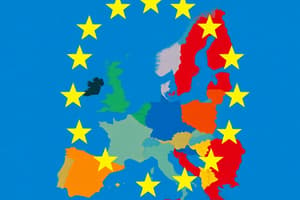Podcast
Questions and Answers
What year was European citizenship established?
What year was European citizenship established?
- 1992 (correct)
- 1995
- 1990
- 2007
Which of the following is NOT a right conferred to European citizens?
Which of the following is NOT a right conferred to European citizens?
- Protection outside of EU territory
- Social security rights (correct)
- Electoral rights in local elections
- Freedom of movement and residence
Which document outlines the fundamental rights and freedoms enjoyed by all EU citizens?
Which document outlines the fundamental rights and freedoms enjoyed by all EU citizens?
- The Treaty of Nice
- The EU Charter of Fundamental Rights (correct)
- The Treaty on the Functioning of the European Union
- The Maastricht Treaty
Which country has an opt-out from the area of Justice and Home Affairs, affecting its application of the Charter?
Which country has an opt-out from the area of Justice and Home Affairs, affecting its application of the Charter?
The European Charter of Fundamental Rights became legally binding in which year?
The European Charter of Fundamental Rights became legally binding in which year?
Which of the following is a right included in the EU Charter of Fundamental Rights?
Which of the following is a right included in the EU Charter of Fundamental Rights?
Which country negotiated a protocol that limited the application of the Charter?
Which country negotiated a protocol that limited the application of the Charter?
Which of the following grounds are NOT explicitly mentioned as protections against discrimination for EU citizens?
Which of the following grounds are NOT explicitly mentioned as protections against discrimination for EU citizens?
What is the function of the European Health Insurance Card (EHIC) for EU citizens?
What is the function of the European Health Insurance Card (EHIC) for EU citizens?
Which of these rights does NOT fall under consumer protection within the EU?
Which of these rights does NOT fall under consumer protection within the EU?
Which document or directive is most directly associated with the right to non-discrimination in the EU?
Which document or directive is most directly associated with the right to non-discrimination in the EU?
Which of the following rights is NOT included in the consumer protection benefits for EU citizens?
Which of the following rights is NOT included in the consumer protection benefits for EU citizens?
What is a key aspect of the right to healthcare for EU citizens traveling outside their country?
What is a key aspect of the right to healthcare for EU citizens traveling outside their country?
Which of the following does the right to non-discrimination within the EU NOT protect against?
Which of the following does the right to non-discrimination within the EU NOT protect against?
Which of these principles is a significant part of the EU's approach to consumer protection?
Which of these principles is a significant part of the EU's approach to consumer protection?
To which demographic does the right to health care in the EU apply when traveling temporarily?
To which demographic does the right to health care in the EU apply when traveling temporarily?
Which body is primarily responsible for safeguarding and interpreting the EU Charter of Fundamental Rights?
Which body is primarily responsible for safeguarding and interpreting the EU Charter of Fundamental Rights?
Under which Article do EU citizens have the right to vote and stand as candidates in municipal elections in their country of residence?
Under which Article do EU citizens have the right to vote and stand as candidates in municipal elections in their country of residence?
What right do EU citizens have when their home country is not represented in a non-EU country?
What right do EU citizens have when their home country is not represented in a non-EU country?
Which Article establishes the right for EU citizens to petition the European Parliament?
Which Article establishes the right for EU citizens to petition the European Parliament?
Which right is specifically outlined in Article 11(4) TEU?
Which right is specifically outlined in Article 11(4) TEU?
Which institution investigates complaints about maladministration in the activities of EU institutions?
Which institution investigates complaints about maladministration in the activities of EU institutions?
Which of the following pertains to the right to access documents held by EU institutions?
Which of the following pertains to the right to access documents held by EU institutions?
What condition must EU citizens meet to exercise their right to free movement within the EU according to Article 21 TFEU?
What condition must EU citizens meet to exercise their right to free movement within the EU according to Article 21 TFEU?
What does Article 24 of the TFEU specifically address regarding citizen initiatives?
What does Article 24 of the TFEU specifically address regarding citizen initiatives?
What does equal access to the EU civil service prevent?
What does equal access to the EU civil service prevent?
What right do EU citizens have regarding communication with EU institutions?
What right do EU citizens have regarding communication with EU institutions?
Which document guarantees the right to good administration in the EU?
Which document guarantees the right to good administration in the EU?
What does Article 24 of the TFEU specifically address?
What does Article 24 of the TFEU specifically address?
What was the outcome of the Czech Republic's negotiation for Protocol No. 30 regarding the EU Charter of Fundamental Rights?
What was the outcome of the Czech Republic's negotiation for Protocol No. 30 regarding the EU Charter of Fundamental Rights?
Which institution is the primary body responsible for ensuring compliance with the EU Charter of Fundamental Rights?
Which institution is the primary body responsible for ensuring compliance with the EU Charter of Fundamental Rights?
What role does the European Court of Justice play in relation to Charter rights?
What role does the European Court of Justice play in relation to Charter rights?
Flashcards are hidden until you start studying
Study Notes
European Citizenship Overview
- Established by the Maastricht Treaty (1992) and reinforced by the Treaty of Lisbon (2007).
- Automatically granted to every national of an EU member state, complementing national citizenship.
Rights of European Citizens
- EU Charter of Fundamental Rights: Legally binding since 2009, protects rights including dignity, freedoms, equality, and justice. Aligns with the European Convention on Human Rights (ECHR).
- Freedom of Movement and Residence: Article 21 TFEU allows EU citizens to live, work, study, or retire in any member state with conditions like financial resources and health insurance.
- Non-Discrimination: Article 18 TFEU prohibits discrimination based on nationality, ensuring equal treatment across member states.
- Electoral Rights: Citizens can vote and stand as candidates in local and European Parliament elections where they reside, as established by Articles 20(2)(b) and 22(1) TFEU.
- Protection Outside the EU: Article 23 TFEU provides consular protection from any EU member state when citizens are in non-EU countries without representation.
Institutions and Mechanisms for Citizen Rights
- European Ombudsman: Investigates complaints about maladministration in EU institutions, ensuring transparency and good governance, established by Article 228 TFEU.
- Petition to the European Parliament: Article 227 TFEU grants citizens the right to petition on matters affecting them directly.
- Access to EU Documents: Article 15 TFEU ensures citizens can access documents held by the European Parliament, Council, and Commission.
- European Citizens' Initiative: Citizens can influence legislative agendas with at least one million signatures from multiple member states, outlined in Article 11(4) TEU and procedural details in Article 24 TFEU.
Language and Additional Rights
- Language Rights: Article 24 TFEU allows communication with EU institutions in any of its 24 official languages and guarantees responses in the same language.
- Right to EU Civil Service Access: Ensures non-discriminatory access to work within EU institutions based on nationality.
- Non-Discrimination and Equal Treatment: Protects against discrimination not just by nationality, but also by sex, race, religion, disability, age, and sexual orientation, as established in the EU Charter and anti-discrimination directives.
- Healthcare Rights: Access to emergency healthcare in another member state through the European Health Insurance Card (EHIC), with rights also covering planned medical treatments across borders.
- Consumer Protection: High level of consumer protections covering product safety, practices, and rights related to online purchases.
Special Conditions for Certain Countries
- Denmark: Has an opt-out from parts of the Charter but generally follows its principles.
- Poland and United Kingdom: Negotiated a protocol regarding Charter application; the Charter no longer applies in the UK post-Brexit.
- Czech Republic: Protocol negotiated but never ratified, thus the Charter applies fully to the country.
Right to Equal Access to the EU Civil Service
- EU citizens are entitled to work in any EU institution, body, office, or agency.
- Equal access means no discrimination based on nationality is permitted.
- This right aims to foster diversity and representation within EU institutions.
- Equal employment conditions are essential for promoting a fair and inclusive work environment.
- The principle supports the idea of a united Europe, reflecting a shared identity among its citizens.
- Encourages the participation of a broad spectrum of citizens in decision-making processes at the EU level.
Language Rights in the EU
- EU citizens can communicate with EU institutions in all 24 official languages.
- Citizens are entitled to receive responses in the language of their choice.
Legal Framework
- The right to communicate in any official language is established by Article 24 of the Treaty on the Functioning of the European Union (TFEU).
- Article 41 of the EU Charter of Fundamental Rights emphasizes the right to good administration, reinforcing language rights.
EU Charter of Fundamental Rights and the Czech Republic
- Protocol No. 30 was negotiated by the Czech Republic, Poland, and the UK to clarify the application of the EU Charter of Fundamental Rights.
- The Czech government requested this protocol during the ratification process of the Treaty of Lisbon.
- Unlike the UK and Poland, the Czech Republic's protocol was never fully ratified and thus did not take effect.
- Consequently, the EU Charter of Fundamental Rights is fully applicable in the Czech Republic, aligning it with other EU member states.
Role of the European Court of Justice (ECJ)
- The ECJ is the main authority responsible for safeguarding and interpreting the EU Charter of Fundamental Rights.
- It ensures compliance with the Charter by EU institutions, bodies, offices, and agencies when implementing EU law.
- The ECJ adjudicates cases involving alleged violations of Charter rights, acting as a judicial watchdog for fundamental rights throughout the EU.
Studying That Suits You
Use AI to generate personalized quizzes and flashcards to suit your learning preferences.




